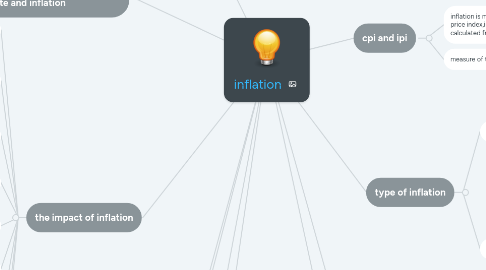
1. keywords
1.1. deflation
1.1.1. period where the level of aggregate demand is falling
1.2. inflation
1.2.1. inflation is the rate at which prices rises general and continuing rise in prices
1.3. deinflation
1.3.1. which is the price is still increase ,but it is lower than before.
1.4. aggregate demand
1.4.1. total demand in the economy including consumption ,investment, government expenditure and exports minus imports
2. relationship between interest rate and inflation
2.1. interest rate is price paid to the lender to borrow money
2.1.1. households ,firms borrow money form the bank more bank depositsmore demand and prices driven up.
2.1.1.1. to lower the inflation,we can increase the interest rate, borrowing will fall as it becomes expensive, money supply grows less quickly and demand will fall
3. the impact of inflation
3.1. prices
3.1.1. as price increase>inflation reduce purchasing power of money>living standard fall cause problem will individual
3.2. wages
3.2.1. firms increases the wages of employees>workers get more money>firms needs to increase the selling price because of higher costs of wages paid.
3.2.1.1. demand for higher wages when there is inflation can cause conflict between employers and trade unions
3.3. exports
3.3.1. inflation higher than other countries>difficult to sell overseas>demand for exports falls, cause balances of payments negatively
3.4. unemployment
3.4.1. firms will be keen to increase output>firms will be recruit more workers>government accept higher level of unemployment
3.5. menu costs
3.5.1. firms increase price quickly>new brochures have to be print,renew everything>cost money eg.a restaurant
3.6. shoe leather costs
3.6.1. firms change price frequently>customers spend more time to find lowest price>shopping around
3.7. business and customer confidence
3.7.1. make consumer anxious, more cautious>reserves for unforeseen circumstances>reduce demand>firms take less risks>economic growth fall
3.8. uncertainty
3.8.1. firms can not predict price ahead a year>making investment decision become more difficult>entering long-term
3.9. investment
3.9.1. spending quite money>hopes of returns over a future period of time>likely to be postponed or cancelled>negative impact
4. redistrict income
4.1. different impact for different groups>may redistribute again
4.1.1. eg.borrowers do better during inflation because the real value fall, so leader gave to change a higher interest rate to compensate for the falling value.
5. uncertainly and falling investment
5.1. inflation inhibits the confidence of customers> lower demand
5.1.1. firms will increase the cost and lower the competitiveness >so firms must rise the interest rate>force firms to postpone capital investment
6. distortion of inflation
6.1. The distortionary effect is called inflation noise which can occur when consumers and producers misperceive relative prices and costs. The effect is most significant when the rate of inflation is excessive. When inflation rates approach zero, inflation noise is minimised.
7. illusion
7.1. is a phenomenon that may arise when rising prices lead people to make irrational decisions
8. cpi and ipi
8.1. inflation is measured using the consumer price index,is a measure of average prices calculated from the same price information
8.2. measure of the general price level
9. type of inflation
9.1. demand-pull inflation
9.1.1. inflation caused by too much demand in the economy relative to supply
9.1.1.1. cause by1.rising consumer spending encouraged by tax cuts or low interest rate
9.1.1.2. 2.sharp increases in government spending
9.1.1.3. 3.rising demand for resources by firms
9.1.1.4. 4.booming
9.2. cost-push inflation
9.2.1. inflation caused by rising business costs
9.2.1.1. caused by1.firms faced with rising cost ,they put up their prices to protect their profits
9.2.1.2. rising costs of important goods, such as oil
9.2.1.3. wage increases will also affect
9.2.1.4. increase in taxation-----rising the selling price can return higher profit
